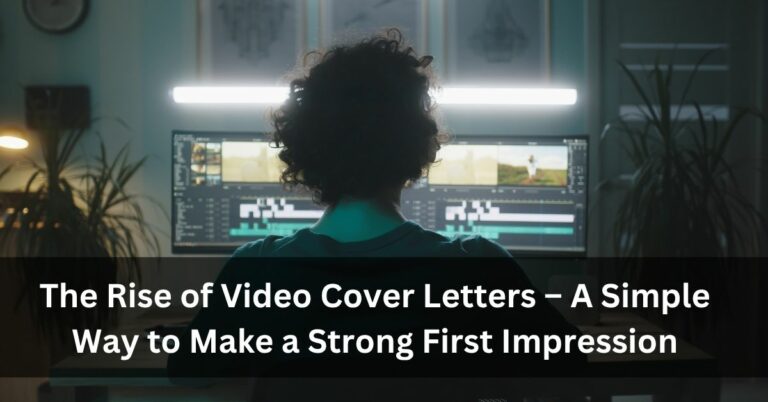How to Write a Simple Cover Letter Using Your Own Story
Many people think cover letters are old-fashioned, but they are still very useful—especially when applying for jobs in 2025. A good cover letter can tell more about you than your resume. It shows how you think, how you talk about your work, and how serious you are about the job.
But here’s the problem: most cover letters sound the same. They start with “I am writing to apply for…” and go on to repeat the resume. This doesn’t help.
That’s why many job seekers are now using stories to write better cover letters. In this blog by Career Builders, we will explain how to use a simple story to make your cover letter better—without using difficult words or trying to impress anyone.
What Is a Story-Based Cover Letter?
A story-based or “disruptive” cover letter is a cover letter that starts with a short, real story from your life or work. This story helps show what kind of person you are and what you can do. It also makes your letter different from the others.
You don’t need to be a great writer. You just need to be honest and keep it simple.
Why Does Storytelling Work?
Stories catch attention. Think about it—if someone tells you a personal story, you’ll remember it. But if someone just lists facts, you might forget.
That’s why using a short story in your cover letter works well:
- It makes your letter more personal
- It shows your skills without sounding boring
- It helps the employer see you as a real person
For more easy job tips, you can always check Career Builders, where we share job advice that is simple and clear.
Step-by-Step: How to Write a Story-Based Cover Letter
You don’t need a special template or big English words. Just follow these 5 steps.
Step 1: Think of a Real Story
Pick a moment when you solved a problem, helped someone, or learned something important at work, college, or during an internship. Make sure the story fits the job you are applying for.
Step 2: Start With That Story
In the first 3–4 lines of your letter, write what happened. Keep it short. Don’t write everything—just the main part.
Example:
“Last year, during my college fest, our team lead fell sick two days before the event. I had to step up and manage the final preparations.”
Step 3: Connect It to the Job
After the story, explain what you learned and how it can help in the job you’re applying for.
Example:
“That day, I learned how to stay calm and get work done under pressure. I think this skill will help me manage tasks in the fast-paced work environment at your company.”
Step 4: Show You Know About the Company
Don’t write a long paragraph. Just say something like:
“I saw your recent campaign on student outreach, and I liked how your team involved local communities.”
This shows that you did some homework and are not sending the same letter everywhere.
Step 5: End Politely and Clearly
Close with something simple:
“I’d love to talk more about how I can help your team. Thank you for considering my application.”
Sample Cover Letter Using Storytelling
Dear Hiring Manager,
Last month, I helped organize a local blood donation camp. On the event day, a supplier cancelled at the last minute. I made a few calls, arranged an alternative, and kept the event running smoothly. We collected over 150 units that day.
This taught me how to handle sudden changes and still stay focused. I believe this skill is useful in any job where planning and quick decisions are needed.
I came across your opening for a project assistant and feel this role matches my interest in organizing and supporting important work. I admire your team’s recent efforts to include more college students in community work.
Thank you for your time. I’d be happy to share more in an interview.
Sincerely,
[Your Name]
You can find more sample letters like this on Career Builders.
Do’s and Don’ts
Do:
- Keep your letter short—one page is enough
- Use real stories, not made-up ones
- Link your story to the job
- Mention something about the company
- Read it out loud before sending
Don’t:
- Copy someone else’s letter from the internet
- Repeat your resume
- Use big words to sound smart
- Send the same letter to every company
For more tips like these, Career Builders has guides made for Indian job seekers.
Why Does This Style Work for Indian Job Seekers?
In India, many job seekers write formal and stiff cover letters because they think it sounds professional. But employers prefer honest and easy-to-read letters. A short story shows your confidence and personality better than long formal lines.
Also, many companies are hiring based on skills and attitude—not just degrees. A good story can show your attitude in a way a resume never can.
Final Words
Cover letters are not about using perfect English or sounding extra smart. They are just about showing who you are and why you care about the job.
In 2025, when hundreds of people are applying for the same job, one short and honest story can make your letter stand out.
Keep it simple. Be real. And tell your story in your own words.
For more help with resumes, emails, and interviews, visit Career Builders, where everything is written in plain language for job seekers like you.
Also read on Career Builders:
- Resume writing for beginners
- Cover letter templates for freshers
- Words to avoid in resumes
- How to follow up after sending your CV
Bookmark Career Builders today for all your job search needs made simple.







